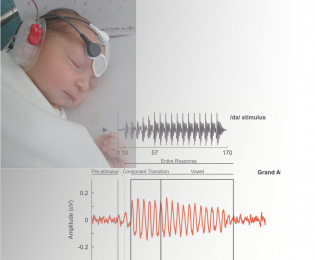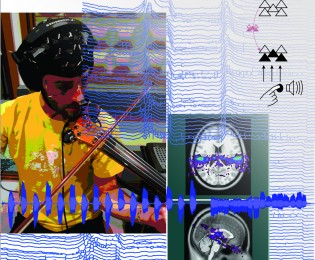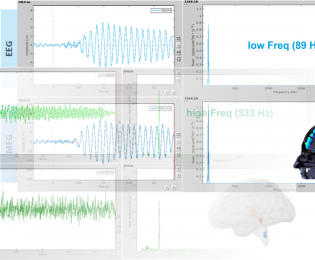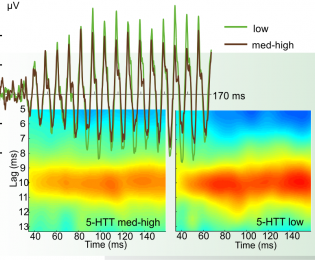Our main current research addresses the neural mechanisms by which the auditory system makes sense of sound, essentially by looking at sensory adaptation and prediction error and their interactions with motor and other cognitive systems at multiple hierarchical levels. More recently we have focused on the encoding of speech sounds in the subcortical auditory system as revealed by the Frequency-Following Response (FFR). Also, numerical cognition is a current hot research topic in the lab. See details of these projects below.

Encoding of speech sounds in newborns: the Frequency-Following Response (FFR) as a biomarker for neurocognitive development
PI: Carles Escera The Frequency-Following Response (FFR) is a fascinating minute brain potential that captures with great fidelity the tracking accuracy of periodic sound features in the auditory midbrain and thalamus as sound evolves in time. With the FFR one can read (and hear!) subcortical neural traces from the human scalp as sounds are transcribed […]
See the full text here
Predictive processes in Motor-Sensory interactions
PI: Iria SanMiguel Active perception and predictive processing Everyone is familiar with bistable stimuli like the Rubin vase, which can be perceived either as two faces or a vase. Similar phenomena occur in audition, for example with sound sequences composed of alternating high- and low-frequency tones, which can be either perceived as a single stream […]
See the full text here
Neural generators of the Frequency-Following Response (FFR)
PI: Carles Escera Seminal studies back to the seventies and eighties of the last century have suggested the Frequency-Following Response (FFR) to originate from neuronal aggregates in caudal brainstem and midbrain auditory nuclei. However, the single MEG study conducted so far to address the sources of the FFR challenged this assumption by disclosing a major […]
See the full text here
Functional significance of genetic advantage in the Frequency-Following Response (FFR)
PI: Imma Clemente, Marc Via, Carles Escera Neurons in the subcortical auditory system replicate the frequency spectrum contained in the sounds we perceive via their phase-locking activity (recorded from the scalp as the Frequency-Following Response or FFR). The FFR sounds as the eliciting stimuli, and it has been used extensively to demonstrate that efficient speech […]
See the full text here
